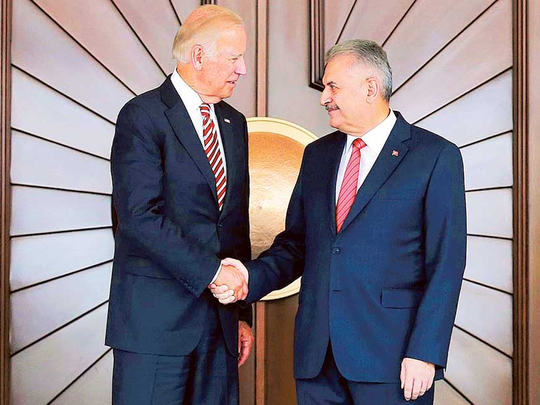
Washington: US Vice-President Joe Biden faced a stiff challenge on Wednesday on a one-day visit to Turkey, a key Nato ally that is reeling from terrorist attacks and a failed military coup and where anti-US sentiment is at a boil.
Biden was expected to reassure Turks and woo back President Recep Tayyip Erdogan, who has sought to show he has alternatives to the US and European support by making friendly overtures towards longtime adversaries Russia and Iran.
Erdogan on Wednesday said he would tell Biden that Washington has “no excuse” for not handing over the Pennsylvania-based cleric blamed for last month’s failed coup.
He said Turkey would continue to provide US officials with documents to demand the extradition of Fethullah Gulen, who has lived in self-imposed exile in the United States since 1999.
Gulen, once an Erdogan ally, denies any involvement in the July 15 coup attempt and has condemned it. But Turkish officials say a network of Gulen supporters for years infiltrated Turkey’s military and public offices to create a “parallel state”.
Erdogan said Turkey and Washington were strategic partners and keeping Gulen would not benefit the United States.
Biden was also expected pressed US concerns about the arrests of thousands of soldiers, teachers, judges, journalists and others purportedly linked to the coup.
Erdogan and many Turks were angered by what they saw as the Obama administration’s slow condemnation of the attempted armed overthrow on July 15, which left more than 300 people dead.
And they are enraged over the US refusal thus far to extradite Gulen.
Both notions have fuelled fierce anti-US rhetoric in Turkey’s government-controlled media even as top officials accuse Washington of aiding and abetting the coup plotters.
“All of that’s malarkey,” responded a senior Obama administration official, imitating Biden during a briefing for reporters on condition of anonymity because of White House rules.
The official said Biden would address the conspiracy theories when he meets with Erdogan at the presidential palace in Ankara. Biden will also meet with Turkey’s prime minister and the speaker of the Grand National Assembly.
Biden, who last visited Turkey in January, calls Erdogan a friend, but the bilateral relationship is at its lowest point in recent memory. His return is seen as a way for the White House to emphasise the importance of US relations with Turkey.
“The rhetoric has been so harsh on the Turkish side,” said Bulent Aliriza, director of the Turkey project at the non-partisan Center for International and Strategic Studies in Washington.
“The most (Biden) can hope for is the optics: re-establishing direct contact, a show of high-level support, the very fact of the contact, that he has come to meet with the Turkish leadership at a time when public opinion is in flames,” he said.
Publicly, Biden will offer enthusiastic support for Erdogan in hope of keeping Turkey in the Nato fold and in the fight against Daesh — and away from Russia and Iran.
Privately, Biden is likely to voice US concern over the mass arrests that Erdogan unleashed after the failed coup.
Washington and the European Union have urged Turkey to respect the rule of law as it prosecutes those responsible for the failed putsch.
Turkey has long sought to join the EU, but Erdogan’s increasingly authoritarian tendencies and, more recently, his talk of reinstating the death penalty jeopardise that membership.
“We will remind them that we are close strategic allies, we had nothing to do with the coup and we are actively helping to find out who was behind it,” the US official said. “We are not at a tipping point or breaking point with Turkey, nor Turkey with Nato.”
The tone from Ankara, however, is quite different.
Erdogan recently flew to St Petersburg, Russia, where he heaped praise on President Vladimir Putin. He now is reportedly planning a trip to Tehran.
Russia and Iran are Syrian President Bashar Al Assad’s strongest military allies, and until now Turkey has joined US calls for Al Assad to step down and is active in the war against Daesh.
But that could change, some Turkish officials warn.
“The huge crack between Turkey and the US, which is getting deeper and deeper by the day, opens the door for irreversible cooperation between Turkey and Russia and other regional actors,” columnist Yahya Bostan wrote in the pro-government Daily Sabah newspaper.
Biden will seek to close that divide, or at least to ensure it doesn’t get worse.
His most complicated challenge is Turkey’s demand for Gulen’s extradition. Erdogan accuses the reclusive cleric of running a cult-like “parallel state” with followers who have infiltrated the Turkish military and civil service and who engineered the coup.
Erdogan said over the weekend that what he considered US vacillations over extraditing Gulen were “overshadowing our strategic partnership.”
Turkey has submitted numerous requests for Gulen’s extradition based on various alleged crimes, but none of the requests has involved crimes related to the coup attempt, the US official said.
One request has been accepted for consideration, the State Department said on Tuesday. But any request will take time and involve the Justice Department and courts.
A Justice Department team arrived in Turkey ahead of Biden to review evidence against Gulen, and the Turkish justice and foreign ministers are expected in Washington again next week to continue to press the extradition case.
For all the tension, most analysts doubt Erdogan will turn his back definitively against the West, since Turkey depends so heavily on trade with Europe and the Nato military alliance.
“There are more question marks over those relationships, and those questions have gotten more serious, and meanwhile Russia and Iran are benefiting,” Aliriza said.
But in the end, he added, “Turkey is not going to give up Nato, the United States, Europe.”- with inputs from agencies











